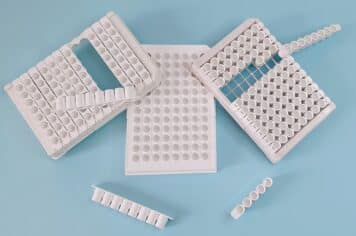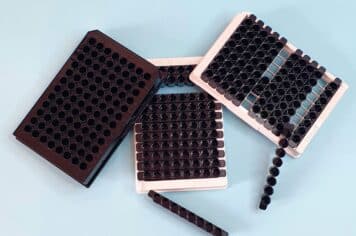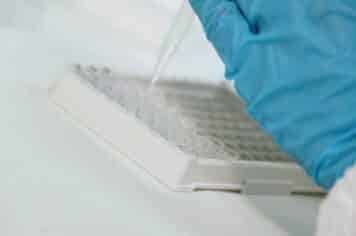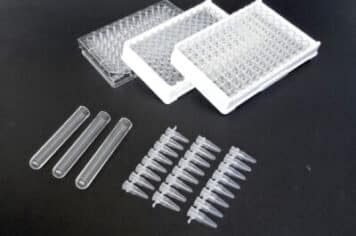No products in the cart.
ELISA Plates for ELISA Assay Kit
Applications & TechniquesBiomat offers both ELISA Plates for ELISA (enzyme-linked immunosorbent) Assay both in High Binding format and Medium Binding format
ELISA Assay Technology is one of the most sensitive and reproducible plate-based technologies available to detect and quantify the presence of specific substances in a complex liquid. The assay you can set up is rapid, simple to perform and easy to automate.
FORMAT & COLOR
Biomat ‘s full range of ELISA 96 well plates include:
- ELISA 96 Well Breakable Strip Plates (on single well-holding frame)
- ELISA 96 Well Strip Plates (assembled on 12 x 8 well-holding frame)
- ELISA 96 Well Solid Plates.
allowing the maximum flexibility for the user.
They are made in Transparent, White and Black Polystyrene and can be used for ELISA, Luminescence (White) and Fluorescence (Black) assays.
Check-out the complete list of Surfaces.
DESIGN
Biomat’s ELISA plate’s design offers the best performances for the following reasons:
- manufactured in pure polystyrene with low fluorescence
- optical quality, important to reduce the background signal, is pursued through the mould design
- inner bottom edged radius of the wells improves the efficiency of washings
- the external lid warrants vertical alignment when using single wells
- a rim protects the external face of the bottom from scratches
- the plates comply with SBS standards and the design assures a good performance in automatic processing plant
Biomat’s ELISA 96 Wells Strip Plates are offered with different Well capacities:
- 350 μl
- 360 μl
- 400 μl
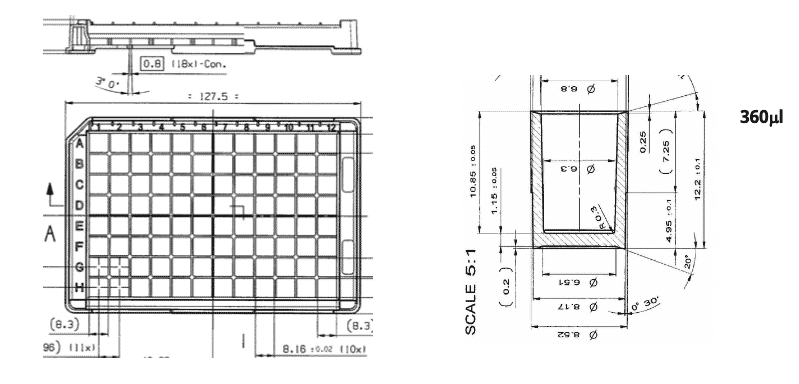
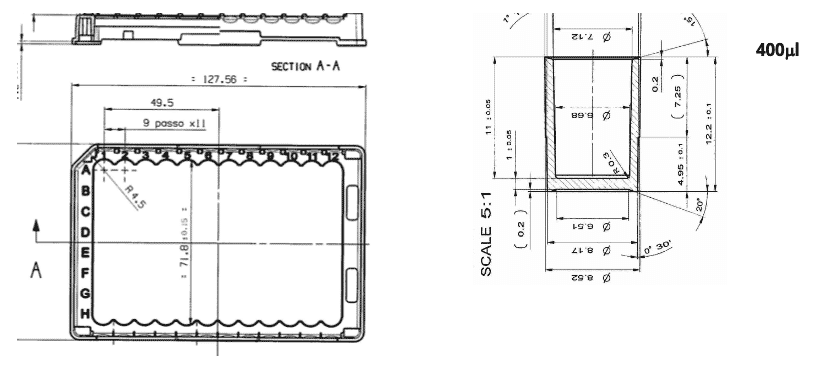
MATERIAL
Biomat’s ELISA microplates are produced in polystyrene, the most widely used material for this application. Polystyrene is hydrophobic however its properties can be modified by performing surface treatments or coatings to accommodate different requirements for diverse applications and its characteristics allow it to be the best suited for microscopic imaging and optical measurements.
Polystyrene is composed of an aliphatic carbon chain with pendant intermittent benzene rings. This provides a very hydrophobic surface and microplates of this type are typically referred to as Medium Binding.
The binding capacity can be enhanced through a surface treatment, such as irradiation, which breaks a certain number of benzene rings, yielding carboxyl (COOH) and hydroxyl (OH) groups. The presence of these groups provides an opportunity for hydrophilic interactions. Microplates modified in this way are typically referred to as High Binding. The resulting surface is primarily hydrophobic with intermittent carboxylic and hydroxylic groups capable of ionic interactions with positively charged groups on biomolecules.

The forces that passively adsorb biomolecules through the surface of ELISA Medium Binding Plates and ELISA High Binding Plates in order of increasing strength are:
- hydrophobic interactions
- ionic interactions
- van der Waals forces
- hydrogen bonding
The above pictures describe the four physical adsorptions that occur when the bio- molecule comes in contact with the bottom of polystyrene microplate.
QUALITY / RELIABILITY
Biomat has selected the best raw materials medical grade to produce its microplates. We mould our ELISA plates in clean conditions and following strict quality controls in complete absence of contaminants.
Thanks to the continue feedback of the clients we have improved the stability of our wells in our frames that come off easily but are also stable in the washing phase.
All lots are tested to guarantee their quality.
HIGH BINDING vs. MEDIUM BINDING CAPACITY ELISA PLATES
The High Binding Surface provides an opportunity for hydrophilic interactions, whereas Medium Binding Surface provides a hydrophobic surface.
HIGH BINDING CAPACITY
Biomat High binding surface is a hydrophilic surface suitable for passive adsorption of proteins with different grades of hydrophilicity. This surface is ideal for immunoassays with a binding capacity of 400 to 500 ng IgG/cm2.
Furthermore, this surface is highly selective and shows high affinity towards the adsorption of molecules also when they are present in very small amounts (<50 ng/cm2) allowing to obtain the maximum sensitivity of the test.
Available configurations
Biomat ‘s High Binding surfaces are available on ELISA 96 well plates:
- ELISA High Binding 8-Well Breakable Strip Plates
- ELISA High Binding 8 Well Strip Plates
- ELISA High Binding Solid Plates,
Available configurations
Analysis results show:
- a comparable binding capacity of proteins of both Biomat HB8 and competitor’s strips
- the capacity of both types of samples to assure the specific binding between the coated protein and the protein to be revealed: 100% of results of our tests (on 232 sera, 94 positive and 128 negative) were confirmed stating the sensitivity and specificity of both types of samples with all the tested sera
- the result of regression analysis, whose acceptable value had been fixed at R 0.95 has been fully respected
- the ranges of coefficients and values obtained in equation y= a+bx where the a values must not significantly differ from 0 and the b values must fall in the range 0.8 – 1.2 proved the strict correspondence of results
MEDIUM BINDING CAPACITY
Biomat Medium binding surface is a hydrophobic surface suitable for passive adsorption of proteins with different grades of hydrophobicity.
It is used in assays in which the adsorbed molecule present large hydrophobic regions, such as antibodies.
Furthermore this surface is highly selective and high affinity towards hydrophobic polypeptides that present molecular weight 10kDa.
Available configurations
Biomat’s Medium Binding surfaces are available on ELISA 96 Well Plates:
- ELISA Medium Binding 96 Well Breakable Strip Plates
- ELISA Medium Binding 96 Well Strip Plates
- ELISA Medium Binding 96 Well Solid Plates
Uniformity
Biomat ELISA High Binding and Medium Binding Microplates show a CV% less than 5 using:
• HIgG as a coating molecule in an ELISA format, anti HIgG-HRP as detector and TMB as substrate.
Discover Biomat’s most requested ELISA 96 Well plates:
- ELISA High Binding 8-Well Breakable Strip Plates
- ELISA High Binding 8 Well Strip Plates
- ELISA High Binding Solid Plates,
- ELISA Medium Binding 96 Well Breakable Strip Plates
- ELISA Medium Binding 96 Well Strip Plates
- ELISA Medium Binding 96 Well Solid Plates
Check out ELISA Assay Technology and 96 Well Plates Well Technical Features articles for more details.
CONTACT US FOR MORE INFORMATION




